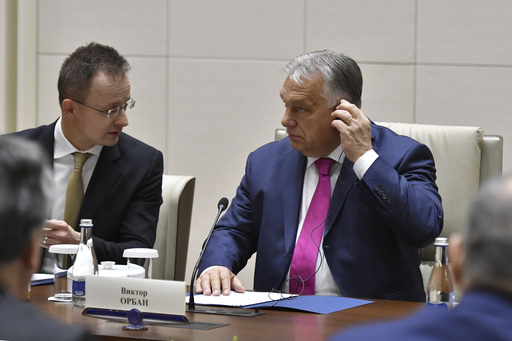
BUDAPEST, Hungary — A gathering of European leaders is set to take place on Thursday in Hungary’s capital as they seek to navigate a shared future amid various economic hurdles and ongoing conflicts in nearby regions. The focus, however, will largely shift to the United States, where the results of an upcoming election could significantly influence political dynamics throughout Europe.
Leaders and analysts alike anticipate a transformation in the transatlantic relationship as a result of the election outcomes. The critical question remains whether changes will be subtle and incremental under Kamala Harris or more dramatic under Donald Trump. The repercussions of the U.S. electoral results could resonate for years, impacting key issues such as the ongoing war in Ukraine, EU trade relationships globally, migration challenges, Middle Eastern tensions, and responses to climate change.
The invitation sent to the heads of the European Political Community, which encompasses nearly 50 nations in Europe and bordering regions (excluding Russia and Belarus), highlights rising concerns. “All this is putting peace, stability, and prosperity at risk in our region,” it emphasizes. One of the prominent attendees expected at the summit is Ukrainian President Volodymyr Zelenskyy, who will likely advocate for increased support for Ukraine in its struggle against Russian aggression. His attendance comes at a critical juncture, particularly as Trump has claimed he could resolve the conflict rapidly if elected, stirring fears in Kyiv about the potential for diminished U.S. backing.
Hungarian Prime Minister Viktor Orbán will host the summit, his support for Trump well-known. Orbán has referred to Trump as a “man of peace” and anticipates a victorious return for the former president, claiming the ongoing legal troubles against him reflect bias within the Department of Justice, a narrative often echoed by Trump supporters. Previously viewed as a controversial figure within the EU, Orbán now chairs the bloc, providing him a significant platform and the responsibility of hosting both the EPC summit and an EU leaders’ meeting following it.
Orbán’s presidency has been marked by turbulence from the outset, encapsulated by his motto, “Make Europe Great Again,” a clear nod to Trump. His unannounced trips to Moscow and Beijing have strained relations with EU counterparts, many of whom perceive his actions as undermining collective interests. In response to Orbán’s self-styled “peace mission,” several EU nations chose to boycott meetings in Hungary or sent lower-ranking officials, though no such boycotts are anticipated for this week’s events.
While Orbán has implied that the U.S. election outcome could dictate Europe’s trajectory—evidenced by a delay in Hungary’s national budget until after a new U.S. president is established—other EU leaders do not share this sentiment. Donald Tusk, the center-right Prime Minister of Poland, emphasized the need for Europe to cultivate its own independent course, one less reliant on American political shifts.
In the lead-up to the summit, Tusk remarked, “Some suggest that the future of Europe hinges on the American elections, but it primarily depends on us—if Europe finally matures and has faith in its own capabilities. Regardless of the election’s outcome, the age of geopolitical outsourcing is behind us.”
